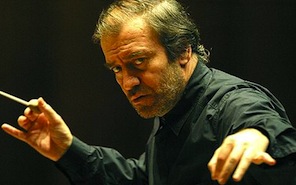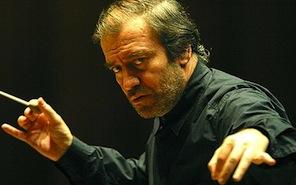
Most of us grew up calling the Mariinsky Theater in St. Petersburg “the Kirov” in “Leningrad.” Reverting to the pre-Communist name may have confused some folks, but no matter. It remains one of Russia’s premier performing arts organizations under its charismatic leader, Valery Gergiev. And it has its own recording label, enjoys strong state support, and is building a state-of-the-art new theater building, so it is likely going to remain at the forefront of music, dance, and opera for a while. And the orchestra is coming to Cal Performances in Berkeley, after opening the Carnegie Hall season this weekend.
You would think, despite the Bay Area’s crowded arts schedule in the coming months, that the imminent arrival of Gergiev and his Mariinsky Orchestra, scheduled to play the complete symphonies of Peter Tchaikovsky, would cause a stir in the press. But since there hasn’t been, here’s the word: There are still great tickets for the three shows available, and it promises to be a big deal.
Like many great conductors of the past century, Gergiev has been overhyped and his flaws sometimes dismissed. He is one of those individuals who possesses such reserves of energy that he can seemingly conduct in four places at once and also take care of the Mariinsky’s administrative tasks. His taxing schedule can sometimes produce lackluster results, as Steven Winn wrote in a review of the Mariinsky Orchestra’s appearance in San Francisco last year. Still, his best is extraordinary, as Anthony Tommasini’s New York Times review of the Metropolitan Opera’s October staging of Mussorgsky’s Boris Godunov makes clear. But I’d bet heavily on Gergiev and the orchestra to deliver the Tchaikovskian goods, for a couple of reasons.
To begin with, Gergiev was Yuri Temirkanov’s assistant at the Kirov/ Mariinsky in the late 1970s, and Temirkanov, I think everyone agrees, knows a thing or three about Tchaikovsky. The orchestra (Russia’s oldest, dating back to the 18th century) has its own traditions, and remains one of Russia’s finest. Gergiev’s own recordings of Tchaikovsky operas (Iolanta, Mazeppa, and The Queen of Spades) show the orchestra’s intimacy with the music — the result of the tradition they inherited, as well as Gergiev’s own individuality.
And, for a second thing, Gergiev has recorded the later symphonies, drawing excellent results from the Vienna Philharmonic, as well as from his own orchestra (in a 2000 recording of the Pathétique). The extra on the upcoming concerts is the appearance of the earlier symphonies, which have often underrated charms of their own. Lately, Gergiev has become a fervent believer in contextualization as a means to unlocking musical truths. He has performed Mahler’s Fourth and Fifth Symphonies on the same (long) program, for example.
With any luck, Gergiev will give us insights into the earlier Tchaikovsky symphonies. These are works organized on traditional principles, which (hindsight shows) impeded the composer’s unique vision of symphonic structure. The Third Symphony especially, with its myriad dance themes and broad contrasts, shows the way to the Fourth, in which Tchaikovsky really began to impose his personality on symphonic form and expression. You can hear them, back-to-back, on the Sunday concert. And as an added bonus, Gergiev appears in conversation with Cal Performances’ Director Matías Tarnopolsky, on Friday, Oct. 14 (5 p.m., Zellerbach Hall). It’s free to the public, and he’s a brilliant talker. So if you don’t want to buy a ticket, you can get a Tchaikovsky fix that way.
It’s strange to be calling concerts of music of the greatest (maybe) Russian composer of them all by a world-famous conductor and a fine Russian orchestra a “sleeper pick,” but consider this: You can get in to see them for 30 bucks.

